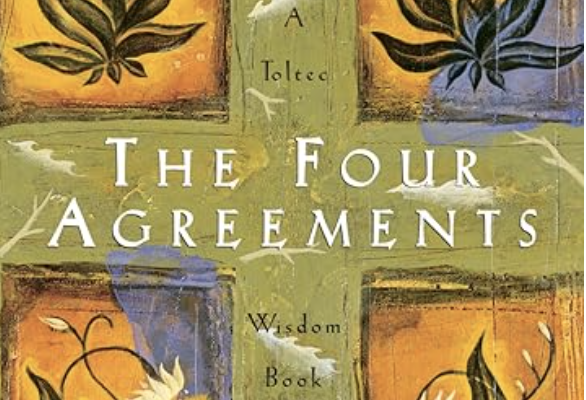The Four Agreements is one of my favourite books. It’s a short read and one I will read every year. Here is a review of the book.
Brief Overview:
“The Four Agreements” is a self-help book that draws on Toltec wisdom to propose a personal freedom and happiness framework. The book emphasizes the power of beliefs and how they shape our reality, suggesting that we can transform our lives by adopting four simple agreements with ourselves. These agreements are:
- Be Impeccable with Your Word: Speak honestly and say only what you mean. Avoid using the word to speak against yourself or to gossip about others. Use the power of your word in the direction of truth and love.
- Don’t Take Anything Personally: Nothing others do is because of you. What others say and do is a projection of their own reality and dream. When you are immune to the opinions and actions of others, you won’t be the victim of needless suffering.
- Don’t Make Assumptions: Find the courage to ask questions and express what you want. Communicate with others as clearly as possible to avoid misunderstandings, sadness, and drama. With just this one agreement, you can completely transform your life.
- Always Do Your Best: Your best will change from moment to moment; it will be different when you are healthy instead of sick. Under any circumstance, do your best, and you will avoid self-judgment, self-abuse, and regret.
Practical Takeaways:
- Improving Communication: Practice being more mindful and intentional with your words to be truthful and loving. This enhances relationships and self-respect.
- Building Resilience: Cultivate a sense of detachment from others’ opinions to strengthen emotional resilience and personal happiness.
- Enhancing Understanding: Encourage open and honest communication to prevent misunderstandings and reduce unnecessary emotional distress.
- Personal Growth: Strive to do your best under any circumstances, which promotes self-improvement and reduces negative self-talk.
Application in Daily Life:
- Mindfulness in Speech: Before speaking, ask yourself if your words are true, necessary, and kind. This practice can transform interactions and perceptions.
- Emotional Independence: Remind yourself that other people’s actions and words are about them, not you. This mindset helps maintain inner peace amidst external criticism.
- Clarify and Express: Don’t hesitate to ask for clarification when in doubt, and express your needs and desires clearly to avoid misunderstandings.
- Self-Compassion: Recognize that doing your best means varying effort and capacity at different times. Be kind to yourself during low points, just as you celebrate high points.
Implementing these agreements in your daily life can profoundly change your perception, interactions, and overall happiness.

